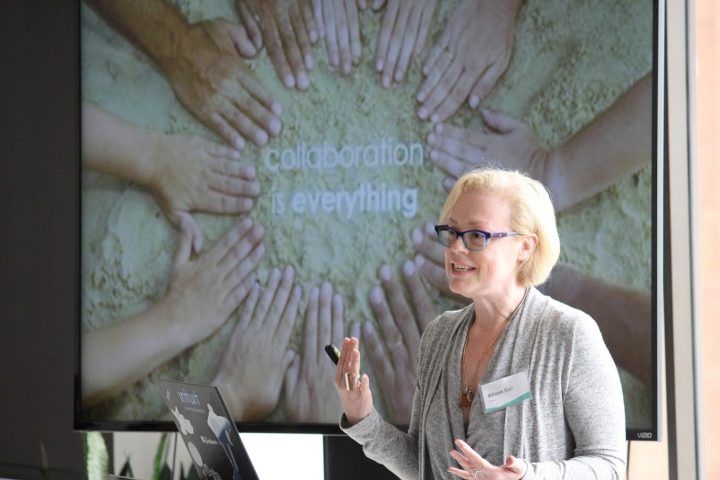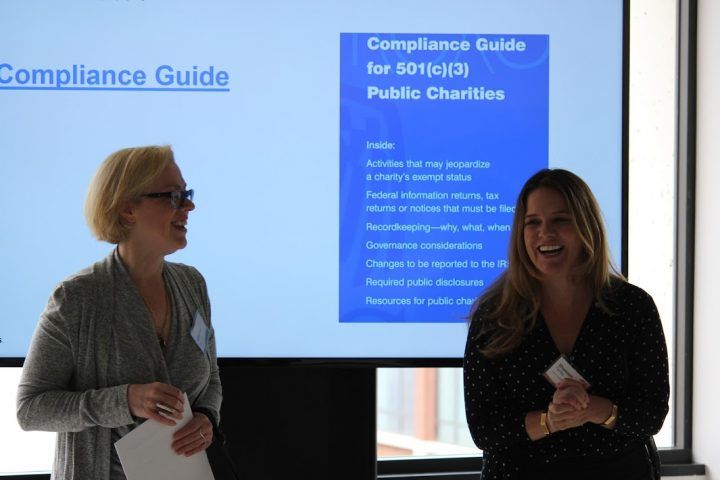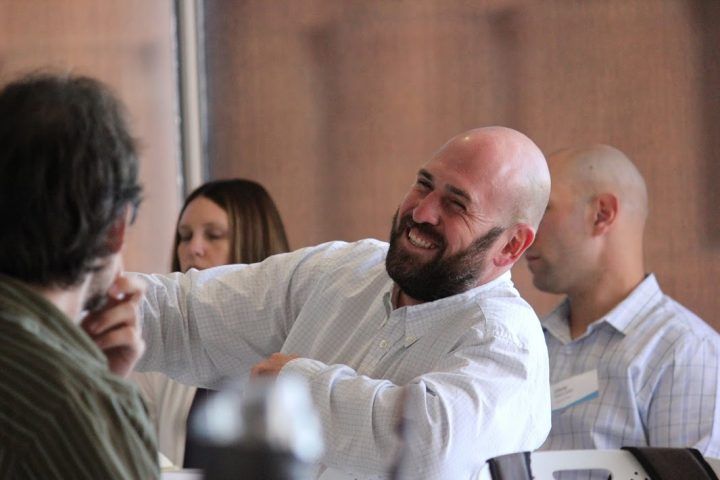Nonprofit Accounting FUN-0-1 with Alison Ball

Accounting can be a scary, overwhelming topic that you might want to ignore. However, nonprofit accounting is critical to sustaining your organization, and even telling your growth story. This is especially true for nonprofits that rely on a variety of funding sources to bring in much-needed capital.
Luckily, we’re here to dispel the myth that accounting can only be described as “hard” or “boring,” thanks to Alison Ball, Manager of Global Influencer Strategy at Intuit. Every year, Alison speaks to the Fast Forward Accelerator about all things nonprofit accounting. As a result, we’re all looking at this critical part of running a tech nonprofit in a much more positive light. Alison shared the most valuable lessons she’s learned from over a decade of experience in accounting and relationship management at Intuit.
1. The Key to Nonprofit Accounting? Get an Accountant.
Let’s start with Alison’s top secret weapon. Close your computer and get an accountant (or qualified bookkeeper, but we’ll use the term accountant for brevity) right away. But, come back after you do! You don’t know what you don’t know, and there are a lot of rules when it comes to nonprofit accounting. In nonprofit accounting, you’re spending other people’s money, so you have to be extra careful. Mistakes can cause you to lose grant money or even get into legal trouble.

Alison Ball
Accountants keep you safe by:
- Knowing the rules (as we said, there are a lot of rules)
- Setting you up on cash vs. accrual accounting
- Knowing when you need an audit
Alison Ball explains, “If you take one thing away from this presentation, it’s the value of an accountant.” They will work with you to ensure you get set up correctly from the start. Look for an accountant who charges a fixed price, including a certain number of check-ins. “They should be paid for the value they deliver,” Alison says, “and not the hours it took for them to do it.” And, if your accountant doesn’t break things down simply for you, they’re the wrong accountant. Make sure you find someone who can speak to you about your finances in layman’s terms. This will enable you to provide an informed report back to your funders and board. Alison recommends using a Certified QuickBooks ProAdvisor – an Intuit-approved expert accountant who supports small businesses and often nonprofits.
2. “I’d Like to Buy an Hour of Your Time.”

Peerlift’s Stravya Alla and Julie Chen
Alison wholeheartedly recommends asking accountants, lawyers, and other experts the following question: “Can I buy an hour of your time?” Go in and pay an expert. Volunteers are amazing, but sometimes, paying an expert is really worth it. Plus, there are funding sources out there that offer funds to get an expert. They’re called “administrative grants.” Just do some digging.
3. Fully Understand the Terms of Your Grant
Receiving grants is great. But, there may be some “gotchas.” For example, some grants don’t allow for any spend on administrative cost. That being said, it’s critical to understand the terms and conditions of a grant, or you could be in trouble. Failing to comply with the fine print might cost you your hard earned funding.
Figure out all the associated restrictions, including allowable (and unallowable) expenses and reporting requirements. Pro Tip? There should be a section in your grant that shows you the allowable vs. unallowable expenses.
4. Cash vs. Accrual Accounting – Know the Difference
The difference between cash and accrual accounting all comes down to timing. When do revenue and expenses hit your books?
Cash Basis Accounting is a method wherein receipts and expenses are recorded only when they are actually received or spent.
Pros:
- Easier for layman to understand
- No accrual journal entries required
Cons:
- Wild swings are possible if you have a seasonal business
- Big surprises can happen if expenses are not tracked carefully
- You must budget carefully
Accrual Basis Accounting records revenue and expenses at the moment they are incurred, independent of the date that money is scheduled to be paid.
Pros:
- Expenses and revenue are matched to the period they apply to
- They’re a “true picture” of profit and project costs
- They allow you to set yourself up for audits
Cons:
- Generally harder for Board or staff to understand
- Accrual entries are necessary each month

Shannon Farley and Alison Ball
Alison recommends organizations use the accrual accounting method. It gives you a better sense of the true financial health of your organization. The extra effort it takes to set up accrual accounting early on is worth it. Remember, you should get an accountant to help you!
5. Bank Feeds are Awesome
A bank feed simply automates something that we all need to do – ensure that whatever hits the bank also hits the accounting system. The best part? Bank feeds cut down on the possibility of fraud. This brings unparalleled transparency to your work. For example, with a program like QuickBooks Online, you can get set up so your board can log in and check out your transactions. (Did we mention that QuickBooks Online is free for nonprofits on TechSoup?!)
6. Your Board Should be a Great Resource

The 2018 Accelerator Cohort enjoy Alison’s presentation.
First thing’s first – if you haven’t, take immediate steps to recruit trustworthy board members. This is mission critical. A reliable board provides fiduciary oversight, expertise and advice, and checks and balances. All ingredients for success. A board should bring fresh perspective to your executive leadership. Plus, a board member with a strong background in finance should be extremely helpful when you’re figuring out your accounting. Pro tip? Give your board access to your books. This transparency is valuable, and could also satisfy some IRS compliance regulations.
7. Take Advantage of FREE Resources
A great accounting system is vital to your organization’s long term sustainability. The good news is that you don’t have to go at it alone. There are ample (free) resources out there that you can use for accounting. A great place to start is to reach out to your local Small Business Development Center to learn about the resources offered near you. There is generally a stable of people excited to support entrepreneurs.
Next, as you should probably know by now, every nonprofit needs a reliable accounting system. Alison recommends QuickBooks Online, because it’s digital, easy-to-use, can facilitate the creation of donation receipts, and is free to nonprofits through TechSoup! Other options include a customer nonprofit system like MIP or BlackBaud, relying on an accountant who can do it all, or using an Excel spreadsheet (which Alison does not recommend because they’re not secure).
8. A Few Notes of Caution
- The person issuing the checks should not be the person signing the checks or taking them to the bank. Avoid fraud by being vigilant.
- Train your staff on the specific purpose of each funding source. This protects your employees from accidentally using restricted money for the wrong purpose.
- Beware of having funding come from one source. Whenever possible, try not to put all of your eggs in one funding basket. If one funding source makes up bulk of your revenue, then as their priorities change, so does the viability of your organization.

Objective Zero’s Blake Bassett and Tim Sorrick take down notes.
9. Encourage Participation by Bringing in Positive Plastic Reinforcement
Okay, okay. So this may not exactly apply to accounting, but it’s too good of a tip not to share! Alison encourages “question asking” and “participation” by bringing really cool Intuit swag to her Accelerator presentation. No question was answered without a gift from Alison. Alison also warned the audience to vigorously road test any and all swag before ordering in bulk. Nobody wants cheesy and dysfunctional swag with their organization’s name on it.

This is what bringing in positive plastic reinforcement looks like.
Thanks again to the insightful Alison Ball for sharing her time, expertise, and swag with us!

Objective Zero’s Justin Miller is thrilled after receiving positive plastic reinforcement.